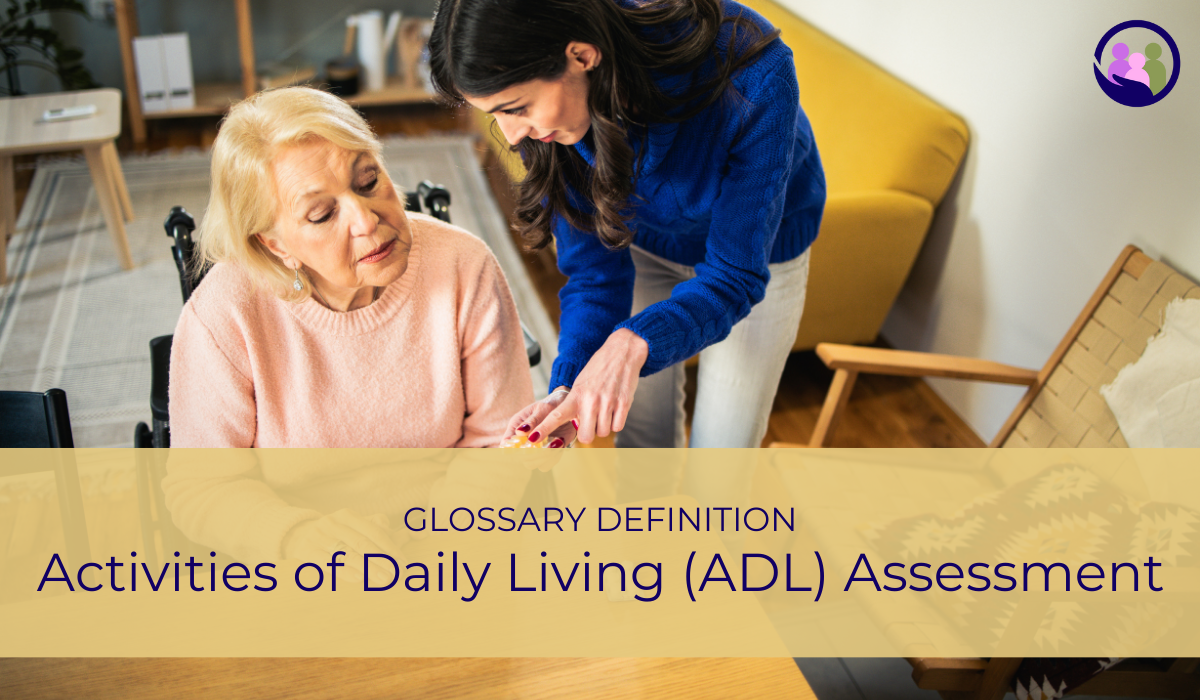Activities of Daily Living (ADL) Assessment | Glossary Definition

Every day, we engage in a variety of tasks that are essential for our well-being and independence. These tasks, known as Activities of Daily Living (ADLs), are the fundamental activities that help us lead a self-sufficient life. ADLs are important not only for personal health but also for healthcare professionals to assess an individual's ability to perform these tasks independently.
In this article, we will explore the concept of ADLs and provide a glossary definition to help you better understand their significance.
What Are Activities of Daily Living (ADLs)?
Activities of Daily Living, commonly referred to as ADLs, are the essential self-care tasks that individuals need to perform on a daily basis to maintain their well-being. These activities encompass a range of tasks that are vital for independent living and can be divided into two categories: basic ADLs and instrumental ADLs.
Basic ADLs:
- Bathing: The process of washing oneself, including showering or taking a bath.
- Dressing: Putting on and taking off clothing, including selecting appropriate attire.
- Toileting: Managing one's personal hygiene and using the toilet.
- Eating: The ability to feed oneself independently.
Instrumental ADLs:
- Meal Preparation: The capability to plan, prepare, and cook meals.
- Household Chores: Tasks like cleaning, doing laundry, and managing finances.
- Medication Management: Organizing and taking prescribed medications.
- Transportation: The ability to use public or private transportation.
The Importance of ADL Assessment
ADL assessment is a crucial tool used by healthcare professionals to evaluate an individual's ability to perform these essential tasks. This assessment helps in several ways:
- Determining Independence: It helps gauge a person's level of independence in daily life. If someone struggles with basic ADLs, it may indicate a need for assistance or care.
- Identifying Health Issues: Difficulties in ADLs can be a sign of underlying health problems or physical limitations. Identifying these issues early can lead to better management and care.
- Care Planning: For healthcare providers, ADL assessment guides care planning. It helps determine the appropriate level of care and support needed for an individual, such as home care, assisted living, or skilled nursing facilities.
- Rehabilitation: In cases of illness or injury, ADL assessments can help track an individual's progress during rehabilitation and set achievable goals for recovery.
- Quality of Life: By addressing difficulties in ADLs, individuals can improve their quality of life, maintain their dignity, and foster a sense of independence.
Who Performs ADL Assessments?
ADL assessments are typically conducted by healthcare professionals, such as nurses, occupational therapists, and physical therapists. These experts use standardized assessment tools to evaluate an individual's performance in ADLs. The results of the assessment can then guide the development of a care plan tailored to the individual's needs.
Conclusion
Activities of Daily Living (ADLs) are the cornerstone of independent living, encompassing tasks necessary for self-sufficiency and well-being. ADL assessment is a vital tool in healthcare, helping professionals gauge an individual's abilities and needs, identify health issues, and plan appropriate care. Understanding ADLs and the assessment process is essential for maintaining a high quality of life, whether you are a healthcare provider or an individual seeking to preserve your independence.
We hope this article has provided you with a clear understanding of Activities of Daily Living (ADL) Assessments. We'd love to hear your thoughts and experiences related to ADL Assessments. Please share your comments and any questions you may have in the comment section below, and let's continue the conversation! Your insights can help others gain a deeper understanding of this important topic.
Caregiver Bliss Glossary
Ready to deepen your understanding of the elderly family caregiver industry? Don't miss out on our comprehensive Caregiver Bliss Glossary, a treasure trove of definitions and insights. Visit our glossary page now to explore a diverse range of terms and concepts that will enrich your knowledge and empower your caregiver journey.
Elderly Parents Resource Page
Explore resources for elderly parents, comprehending the benefits, considerations, and choices that come with aging. Explore our comprehensive Elderly Parent Resource Page for valuable insights, practical tips, and expert guidance on addressing the unique challenges of aging parents, bridging the gap between independent living and tailored care options.
Free Caregiver Bliss Weekly Email Newsletter
 Are you a dedicated family caregiver looking for valuable resources, support, and advice to enhance your caregiving journey?
Are you a dedicated family caregiver looking for valuable resources, support, and advice to enhance your caregiving journey?
Look no further! Our Caregiver Bliss Weekly Email Newsletter is designed to provide you with the latest insights, tips, and updates tailored specifically for family caregivers like you.
Sign up now and gain access to a wealth of information and support that can help you navigate the challenges and joys of caregiving.
